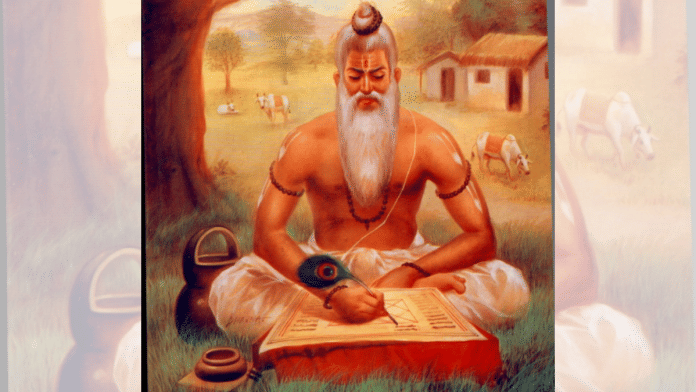Thank you dear subscribers, we are overwhelmed with your response.
Your Turn is a unique section from ThePrint featuring points of view from its subscribers. If you are a subscriber, have a point of view, please send it to us. If not, do subscribe here: https://theprint.in/subscribe/
Several Hindus believe that singing the praises of the Manusmriti even when they haven’t read it, automatically makes them more of a Hindu, and grounds them more solidly in their ancient faith. The reality is the opposite; the Manusmriti actually takes them away from pristine Hinduism.
The confusion arises because of the presence of the word “Manu” in the name. We must know that Manu, who is regarded in Hinduism as the progenitor of all mankind, did not write the Manusmriti. He wrote only the first 59 verses of it, as is evident from the text itself. He handed over the task to his disciple, sage Bhrigu. But even sage Bhrigu couldn’t have written the crucial part of the present version of Manusmriti – – the Heredity–based Caste System. There are two reasons for believing so.
Firstly, Bhrigu was one of the few sages created by Lord Brahma Himself, to assist Him in the creation of the universe. Lord Brahma is also regarded as the source of divine wisdom enshrined in the four Vedas, including the earliest, the Rig Veda. A verse from the Rig Veda says (Book 9, Hymn 112, Verse 3):
“I am a reciter of hymns, my father is a healer, and my mother is a grinder of corn. Having various occupations, desiring riches, we remain (in the world) like cattle (in the stall)”.
This shows that members of the same family could follow different professions, which would put them in different Varnas or castes. It clearly indicated that occupation or caste was not hereditary. This wisdom or directive was enshrined in the oldest scripture of Hinduism, and sage Bhrigu couldn’t have been oblivious of this fact.
The second reason is even more convincing – – why sage Bhrigu couldn’t have said that the Caste orVarna of a person was hereditary, or rigidly linked to their family.
Bhrigu was also the author of another book titled, Bhrigu Samhita, a pioneering work on Vedic astrology. According to it, a person’s aptitude, temperament, and destiny were determined by the position of stars at the time of that person’s birth. If Bhrigu were to insist in the Manusmriti that “no”, these aspects were actually hereditary, then it would tantamount to asserting that a person’s destiny (and therefore occupation) were determined by the position of stars at the time of their father’s birth !!
So, the Caste System that we read in the Manusmriti today was not written by Manu, or sage Bhrigu. Then the million dollar question is: “who did it?”
The only possibility is that it was written into the Manusmriti by the Brahmin scholars in whose custody the text remained for hundreds of years. They knew that the Manusmriti was a Smriti and not a Shruti, meaning that it was not given by God. So they felt free to “edit” it. And they edited it in a way that would give permanent supremacy to their community, for all times to come. In doing so, they even defied Lord Krishna’s concept of Gunas as pronounced by Him in the Bhagavad Gita.
The sleight of hand pulled off by the medieval Brahmins was shocking no doubt, but ironically, there is a big positive side to it. Their chutzpah should give courage to the Hindu enthusiasts of today, to feel free to EDIT the Manusmriti one more time. This time around, to bring it in tune with modern sensibilities. Because, it would be untenable to expect the Hindu masses to accept the present version, which is replete with many inhuman verses, full of cruelty and callousness.
The edicts of the Manusmriti about women and certain sections of Hindus called the lower castes or Shudras, are the cases in point. Consider this verse, for example :
“One should not sit alone with his mother, sister or daughter. The powerful host of sense-organs overpowers even the learned.”
(The Manusmriti Chapter 2, Verse 215).
Is the Manusmriti trying to tell us that every woman, as a mother, sister or daughter should be viewed with suspicion? And who is the “learned” man the verse is so concerned about? What do we actually see in the world around us – – who are more smitten by sexual perversions in general, men or women?
Sadly, the Manusmriti’s inhuman verses regarding the Shudras are now inspiring some Hindus to target the non-Hindu members of our society. These misguided Hindus do not understand the benevolence of their pristine religion, and are in fact tarnishing the image of Hinduism under the influence of Manusmriti. They must read this regressive document, to realize that in its present form, it only deserves to be dumped.
These pieces are being published as they have been received – they have not been edited/fact-checked by ThePrint.



Very articulately expressed. It does seem obvious that the caste system was not hereditary but based on the professions of individuals. There is so much to learn n to go beyond simplistic generalisations of the past.